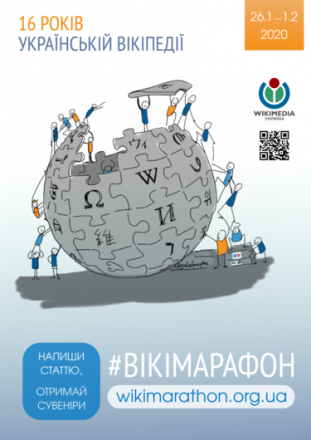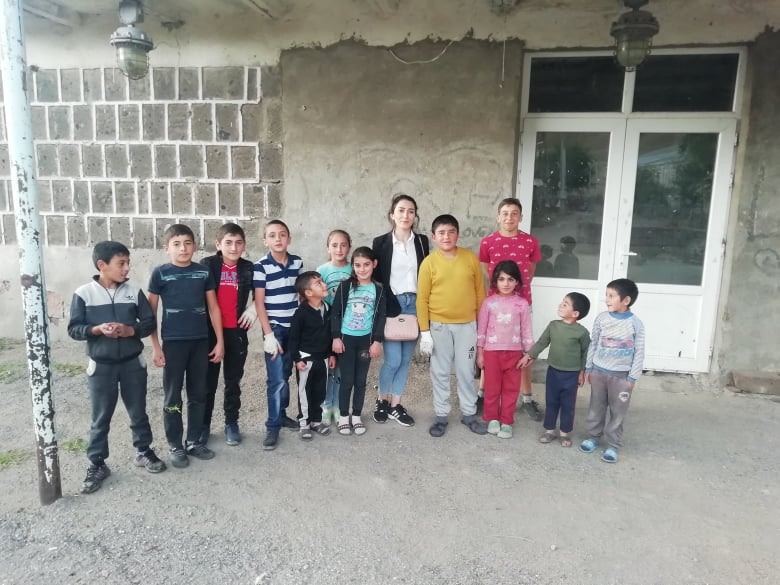by Maksym Mazypchuk, Local Correspondent from Ukraine.

In January 2020, the Ukrainian Wikipedia celebrated its 16th anniversary and announced the contest for the best articles.
Since 2015, the Wikimarathon has been held annually on the birthday of the Ukrainian Wikipedia. The number of visitors to the Ukrainian Wikipedia is growing very fast. It is one of the first places in the world in terms of visitor growth and the third biggest in the Slavic segment after Russian and Polish.
Colossal work is conducted by passionate volunteers without any financial remuneration. A few hundreds of enthusiasts regularly fill the Ukrainian Wikipedia with articles on a wide range of topics.
“I started writing and editing articles when I was a student. I am a historian by education and saw that there were comparatively low numbers of articles on Ukrainian history in Wikipedia. So, I decided to write about the topics I know the best. Later on, I began to write on geographical and other topics. I even have an article about a Ukrainian musician and a Dutch astronomer. Also, I participated in two expeditions within the “Wikiexpedition” project.
I like to fill in the information gaps that exist in the internet space. Unfortunately, in Ukraine there is a gap between paper and electronic media. If a whole book can be written from the history of a village, there will be an article of two sentences and no photo on the network. I try to contribute to reducing this gap,” Vadym Nazarenko, science officer of the National Museum of Folk Architecture and Life of Ukraine.
In 2019, for the first time in the history of the Ukrainian section, an article overcame one million views a year. Mainly, articles on specific topics are written by people who understand the subject. But this does not mean that they are qualified specialists in the field. As a result, enthusiasts who want to learn more on a topic are those who write articles.
“In recent years, Ukrainian Wikipedia has been steadily and firmly developing: the number of articles is rapidly increasing. Soon the number of articles will cross a million, the popularity and attendance are growing and so on. At the same time, the Ukrainian-language Wikipedia community – like the Wikipedia community in general – draws attention to new problems, such as the fight against gender imbalance and stereotypes, applies new technical solutions, etc. The purpose of the 2020 Victory Marathon is to engage as many people as possible in building Ukrainian Wikipedia,” Anton Protsiuk, editor and administrator of Ukrainian Wikipedia.
Often Wikipedia contributors paying attention to socially relevant topics, for example cybersecurity. In 2018, Wikipedia in Ukraine conducted competition “Writing about information security.” The authors have created about 500 articles related to cybersecurity, cryptographic protection, and other related topics. They were evaluated by a jury of IT professionals. Also, NGO “Wikimedia Ukraine” aims to involve more women and girls in editing Wikipedia, trying to draw more attention to articles about women and girls.
“There are several aspects to the social significance of filling the Ukrainian Wikipedia. First, it helps to develop the Ukrainian language in general: Wikipedia is already the largest Ukrainian encyclopedia ever created, but it has still a lot to develop. Second, the development of Wikipedia means the development of free knowledge. The mission of the Wikipedia community and its related projects is to build an infrastructure of free, uncensored knowledge that is accessible to everyone and free of charge,” Anton Protsiuk.
Wikipedia decentralized bottom-up knowledge and content-making approach engaging a broad audience. The main thing that gives Wikipedia in the context of the country’s development is a place where people сan learn about cybersecurity, new technologies, Ukrainian heritage, history, culture, and many other fields.
This article was produced by Maksym Mazypchuk, the Project’s local correspondent and EaP Civil Society Fellow from Ukraine in the framework of the EU-funded ‘Eastern Partnership Civil Society Facility – Regional Actions’ Project. Its contents are the sole responsibility of Maksym Mazypchuk and do not necessarily reflect the views of the European Union or the Project.
Read more about our local correspondents here.




